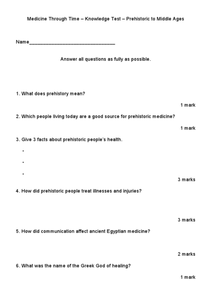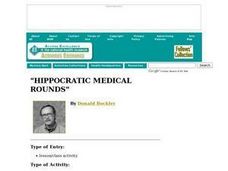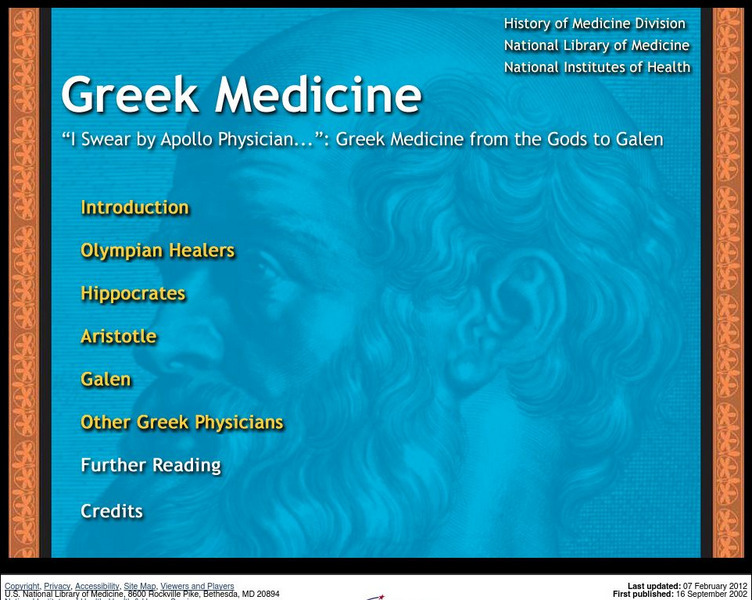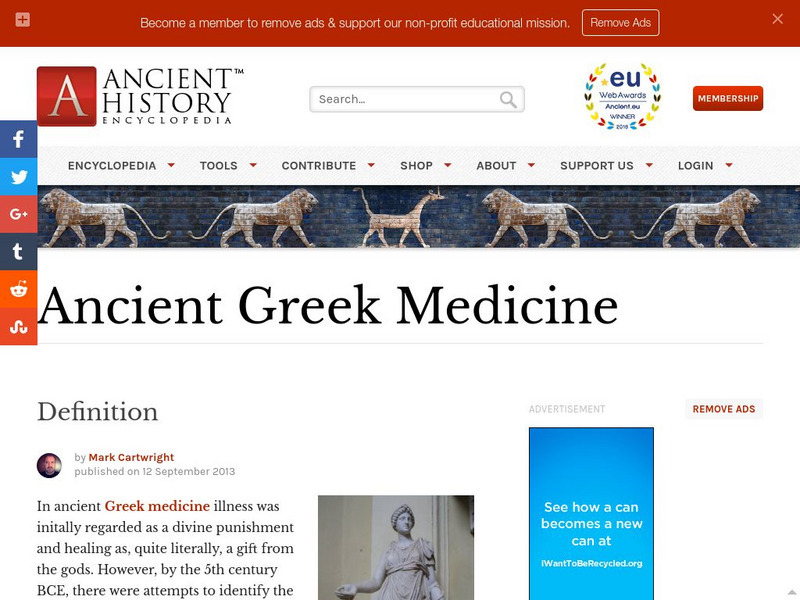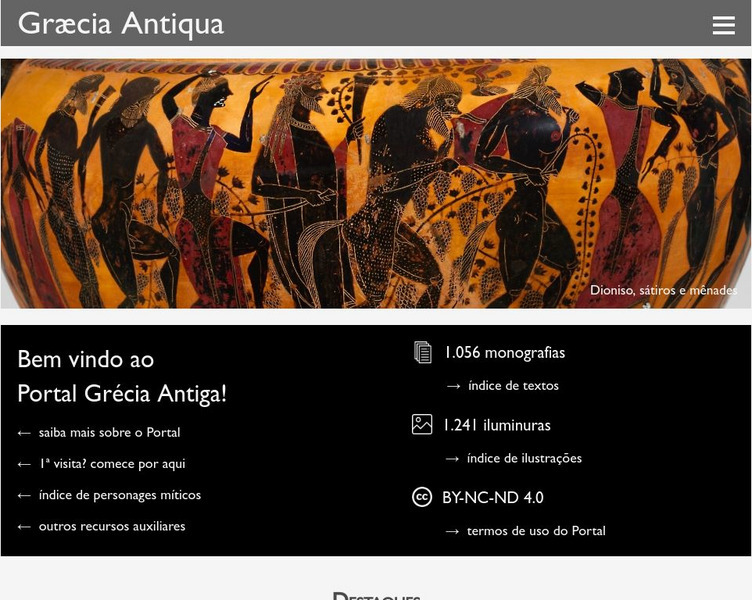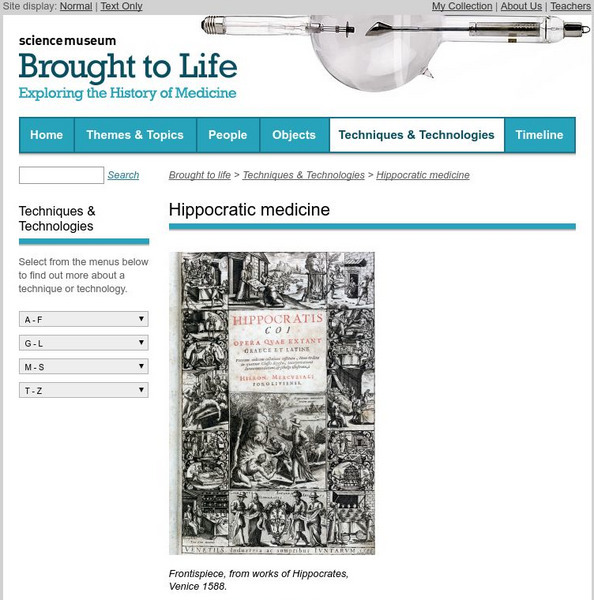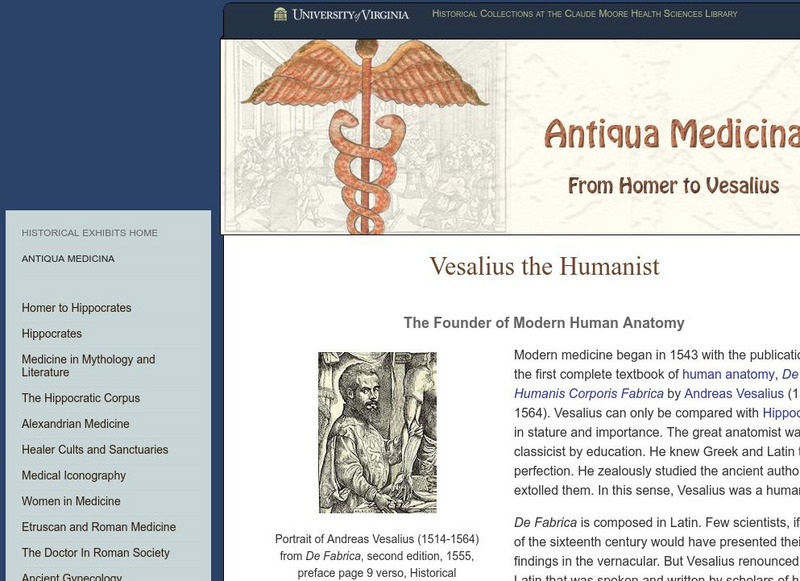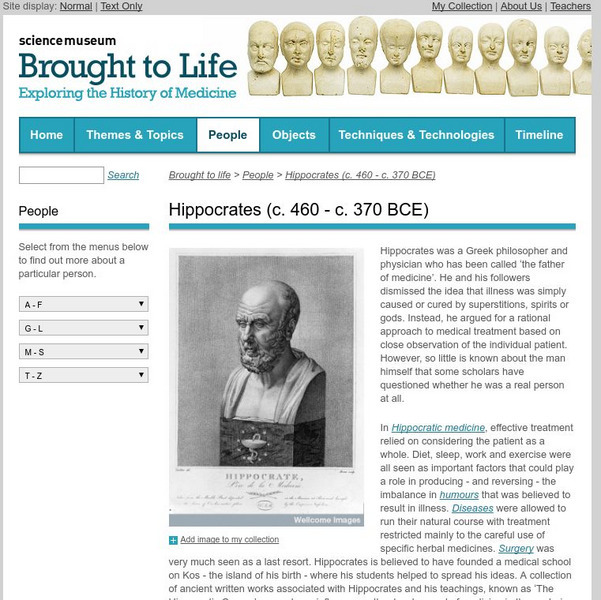Curated OER
Medicine: Then and Now
Students read ancient Greek texts to explore ancient healing practices and compare them to modern-day medicine. They conduct research into modern first-aid practices, using a standard medical reference.
Curated OER
Medicine: Then and Now
Middle schoolers read ancient Greek texts to explore ancient healing practices and compare them to those of modern times. They explain Greek healing practices for wounds.
Curated OER
Medicine Through Time Giant Crossword
In this recognizing the history of medicine crossword worksheet, learners use the across and down clues to review medicine, diseases, and people through time. Students write 31 answers.
Curated OER
Medicine Through Time
In this medicine in history worksheet, students read through the questions about the history of medicine. Students give short answers to the 18 questions.
Curated OER
The Rise of Islam
For this Islamic medicine worksheet, students read about the rise of Islam and the history of medicine within the culture. Students read 5 passages.
Curated OER
Hippocratic Medical Rounds
A very interesting way to model Hippocrates allows your clas to to compare world views and to illustrate how ideas have changed at key times throughout the history of science. This simulation has students role play patients and physicians.
Curated OER
Orfeo: Sinfonie e Ritornelli
Students identify the dramatic expression made by performance and how it relates to the content of the story L'Orfeo. They determine the form of orchestra and each instrumental group within the orchestra for this piece.
Other
Ancient History: 10 Ancient Greek Inventions and Discoveries Still Used Today
Ten of the important inventions and innovations of the ancient Greeks are described. These include the water mill, the odometer, alarm clocks, cartography, the Olympics, geometry, Hippocratic medicine, philosophy, democracy, and...
National Institutes of Health
National Library of Medicine: Greek Medicine
Much like a great deal of western culture, modern medicine also finds its roots in ancient Greek civilization. Travel to the time of the Olympians and ancient healers to discover just how much we have learned and gained from those who...
World History Encyclopedia
World History Encyclopedia: Greek Medicine
Discusses the history of Greek medicine from ancient times, and the impact of important figures such as Hippocrates, Diocles of Carystus and Praxagoras of Cos. Some of the significant advances in diagnosis and treatment are described....
Able Media
The Asclepion: Medicine in Ancient Greece
Impressive Classics Technology Center site lists the achievements of the ancient Greeks in medicine from the time of Homer up to Hippocrates and the plague of Athens during the Peloponnesian war. Gives evidence from ancient texts.
University of Virginia
The Surgery of Ancient Rome
This illustrated article dicusses an exhibition on the surgical instruments used by the Roman during ancient times.
Greek Gods
Greek Gods: Demigods & Spirits: Asclepius
Asclepius, the god of healing and medicine, was the personification of the ideal doctor. He even had the power to raise the dead. Zeus feared his power; read to find out what he did to Asclepius.
Other
Greek Medicine: Hippocrates: Father of Medicine
Looks at the life of Hippocrates and the significant impact he had, and continues to have today, on the practice of medicine.
World History Encyclopedia
World History Encyclopedia: Asclepius
Entry delves into the life of the Greek god of medicine, Asclepius, with a discussion on how he was portrayed in mythology and art.
Other
Greek Medicine: Aristotle: Father of Science
Provides a basic overview of Aristotle's life and accomplishments. The 'Aristotle in a Nutshell' section provides a useful list of his ideas in the many disciplines he studied.
Other
Revista Eletronica: Grecia Antiga (In Portuguese)
A comprehensive collection of digital artifacts and articles on Greek culture from antiquity to modernity. Many aspects of Greece's development, from philosophy, mathematics, writings, medicine to language, are covered. Check out "Quid...
Science Museum, London
Science Museum: Brought to Life: Hippocratic Medicine
A brief overview of Hippocratic medicine.
University of Virginia
Etruscan and Roman Medicine
Gives a short description on the practice of medicine in Etruscan and Roman societies. The first doctors came from Greece but Roman medicine tended to be more of a "home remedy," situation.
National Institutes of Health
Nat'l Library of Medicine: Islamic Culture and the Medical Arts: Greek Influence
This site details Greek and other influences on Islamic medicine and includes illustrations of Arabic translations of earlier texts. Mentions The House of Wisdom (Bayt al-Hikmah) and its origins.
University of Virginia
Univ. Of Virginia: Andreas Vesalius, the Humanist.
Information on Andreas Vesalius, who wrote the first complete textbook on human anatomy from researching ancient Greek anatomy. It also explains the humanist philosophy.
University of Virginia
Antiqua Medicina: Hippocrates
Short, illustrated essay about Hippocrates and the central role he plays in understanding how medicine was perceived and practiced by the ancient Greeks. [Link back to the Antiqua Medicina home for access to a complete history of...
Science Museum, London
Science Museum: Brought to Life: Hippocrates (C. 460 C. 370 Bce)
A brief overview of Hippocrates and his ideas about effective medicine.
Centers for Disease Control and Prevention
Centers for Disease Control: Emerging Infectious Diseases: The Thucydides Syndrome
A detailed description of the symptoms of the plague in Athens and an attempt to diagnose the illness. (Volume 2, Number 2/April 1996)





